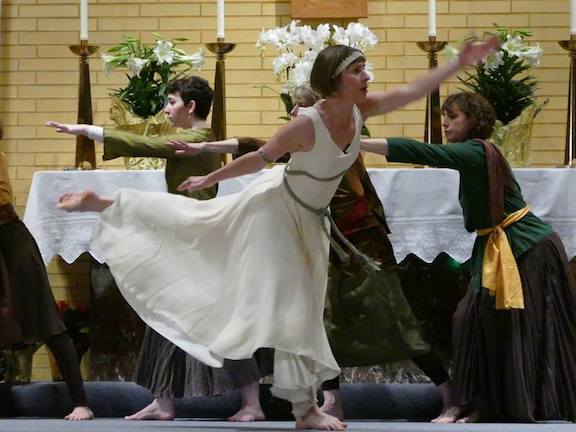In the 1980s, I attended a Midwest seminary that was schizophrenic with respect to the Faith. The moral theology department was very orthodox. But Scripture studies were essentially liberal Protestant. And the formation team was hopelessly dissident and liberal. One of the Scripture professors, Father Otto, was a Hungarian refugee. He was friendly, kindly, fiercely anti-Communist – and a disciple of Rudolf Bultmann, the famous (or, as I prefer, the infamous) liberal Protestant theologian whose scholarly technique of “demythologizing” Scriptures corrupted generations of students.
Since our Scripture studies were essentially divorced from the Catholic faith, it was only natural that we allowed Protestant seminarians to attend classes. I sat next to a rather charming African-American young lady who aspired to become a Methodist minister. She was also an advocate of multiculturalism. We had friendly chats.
During the semester, Father Otto asked each student to make a class presentation, usually a book report. On the day of her assignment, the young lady showed up with a slinky body suit. She placed a record player in the front of the class. After reading a passage from Saint Paul, she proceeded with an interpretative dance accompanied by a modern version of a Negro spiritual.
Her prancing was self-serious, shockingly absurd, maybe even intentionally campy (as they say in the movie biz), and very, very funny. The seminarians sat in stunned silence. Keith, a young guy from Pittsburgh, who looked like a steelworker, sat stiffly, with jaw dropped. Others were wide-eyed, equally startled.
For my part, I was horrified to feel laughter rising. Every passing second seemed an eternity. Our attention to the young lady arose from either horror or fascination. So perhaps “horrified fascination” describes the effect of her camp act. And I was in mortal combat with an impulse towards uncontrolled laughter.
At last, her dancing came to a dramatic end – body on the floor, arms extended as if on a cross. I got myself under control. It was over. Or so I thought.
As a delayed vocation, resistant to the shenanigans of modern seminaries, I was already known to the formation team as “rigid and judgmental” because I held to the Church’s teaching on contraception and priestly ordination. And I used to assert, privately, to my classmates, that I had “celibacy problem.” I was in favor of it. Those were fighting words in the age of the dissident promotion of “optional celibacy.”
So laughing at the theological dance would have confirmed the formation team’s worst fears. My “rigidity” would conflict with the hallowed multicultural programs of chanceries everywhere. And I could not be counted on to support “folk” and “mariachi” Masses and songs from the Gay Jesuit Hymnal (not the exact title). I dodged a bullet.
Almost.

The young lady solemnly arose with a question for us: “How did this make you feel?” A young Wichita seminarian stared into space, his face ashen, probably with the cold realization that he wasn’t in Kansas anymore. Another young man had beads of sweat on his brow.
Oh, no, I prayed! No “feelings statements” please! As an old man, Father Otto may not have had the same “feelings response” as these young men. After all, most of them were not gay. But the silence could not be broken and continued for another minute.
Please, please, young lady, I pleaded silently, sit down and torment us no more. But she just could not leave well enough alone.
“I guess that’s a statement in itself.” The men remained statue-like. My impulse to laugh couldn’t be suppressed much longer. Feigning an emergency bathroom call, I exited the room, closing the door behind me with hopes that nobody would hear me laugh in the hallway.
I failed. And anticipated facing a very serious “formation issue.” Later in the day, I crossed paths with a good, orthodox classmate. As a friend, he worried that I would be kicked out of the seminary.
An examination of conscience was in order. Was my laughter derisive or uncharitable – or rooted in a Christian sense of the absurd? At the time I wasn’t sure. But I reasoned it wouldn’t hurt to be honest with the professor, the kindly but eccentric Father Otto.
I had nothing to fear from him. It was the formation squad (run by a feminist nun and a wolf-in-sheep’s-clothing pop psychologist) that would be a problem if word got to them. Hence that evening, over dinner in the seminarians’ dining room, I explained my behavior to Fr. Otto. I was, after all, a backward Midwestern boy, not used to the finer things, ahem, of our culture.
I sent a draft of this article to a Catholic layman friend, who wrote, “Why did you wait until the hall to laugh? It would have been an act of charity for your colleagues, to unveil the intimidation and contempt she was displaying towards them.”
True, but he missed my point. I’m just describing the totalitarian liberal nature of seminary formation in those days – which is related to and helps us to understand the general timidity of many priests and bishops today.
We find ourselves increasingly ashamed of the normal. We oppose global warming and restrictions on immigration (because it’s popular and easy) rather than vocally upholding Christian marriage and the Church’s teaching on human sexuality (because it’s unpopular and hard).
And at least I have some empathy for what many people now experience in the modern workplace. And a better understanding of why so many Nazi concentration camp inmates marched meekly into those gas chambers.














